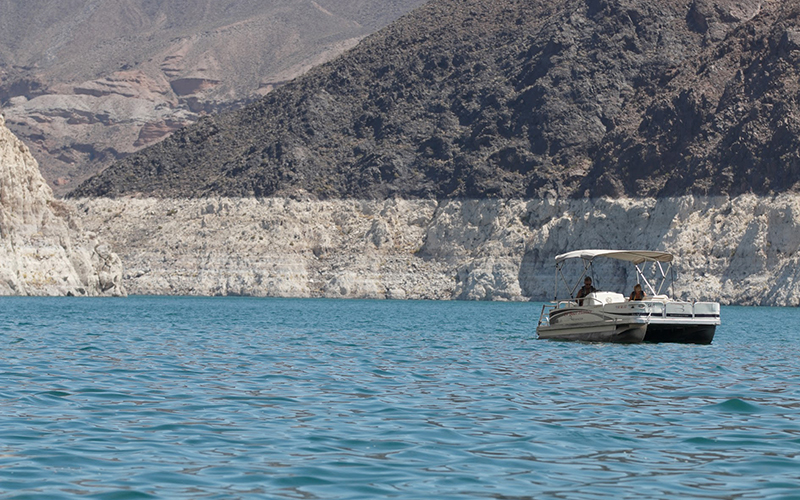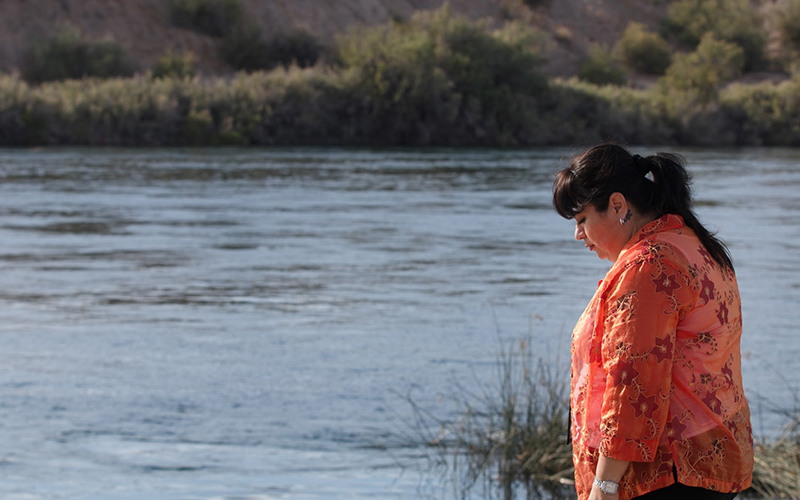
The calcium markings on the rock formations in Lake Mead, a Colorado River reservoir, show the impact of a 17-year drought on water levels. (Photo by Alexis Kuhbander/Cronkite News)
PHOENIX – States in the Upper Colorado River Basin are telling downstream neighbor Arizona to get its act together.
Members of the Upper Colorado River Commission sent a letter late last week to Arizona water officials, saying the state is threatening the water supply for nearly 40 million people, according to the Nevada Independent.
The letter, addressed to Arizona Department of Water Resources Director Tom Buschatzke, criticized a water management strategy of the Central Arizona Water Conservation District.
The water district manages Arizona’s allocation of Colorado River water and operates the Central Arizona Project, which brings river water to Tucson and Phoenix. The commissioners object to the district’s intention to keep Lake Mead at a so-called “sweet spot” to stabilize water levels at the reservoir.
That’s because doing so would trigger more water infusions into Lake Mead from Lake Powell, which the upper-basin states of Colorado, New Mexico, Wyoming and Utah rely on as their water bank. Under the 1922 treaty that established the states’ water-sharing rights – as well as a 2007 agreement – upper-basin states must release water from Lake Powell for the lower-basin states of Arizona, California and Nevada.
The commissioners’ letter expressed deep concern that the Arizona water district “intends to disregard the basin’s dire situation at the expense of Lake Powell and all other basin states.”
Don Ostler, executive director of the Upper Colorado River Commission, put it more bluntly. “That kind of manipulation is unacceptable to the Upper Basin,” he said in an interview.
The letter echoed an argument long made by Buschatzke of the Arizona Department of Water Resources.
“It raises important questions about actions taken by Central Arizona Water Conservation District that threaten to blow up the collaborative effort that we have been enjoying on the Colorado River for the last 20 years,” Buschatzke said.
Conservation district officials were “surprised and disappointed” by the letter, and they issued a statement that said they’ve been “reaching out to our partners in the Upper Basin, hoping to clarify apparent misunderstandings, and to facilitate in-person, collaborative discussions aimed at finding solutions that will benefit the communities and environment served by this mighty river.”
District officials also noted that the agency has conserved water on behalf of Lake Mead, “at a significant cost to (Central Arizona Project) water users in terms of water and water rates.”
Ted Cooke, general manager at CAP, said in a March post on the project’s website that officials are trying to seek balance between using and conserving water, but he called the situation a dilemma.
The debate over the “sweet spot” – and which water agency should have the power to decide to leave some conserved water in Lake Mead – has occupied Arizona’s water community for more than a year. The Upper Colorado River commissioners urged Arizona to get its internal house in order so all seven states and Mexico can plan for long-term drought.
“The seven Colorado River Basin states and Mexico are connected at the hip in this river,” Ostler said. “And what is going on with regards to one state, its failure to make progress, is having an effect on all seven states.”
Buschatzke and Arizona Gov. Doug Ducey are trying to get big-ticket water legislation through the Legislature this year. But time is running out on the legislative session.
This story is part of Elemental: Covering Sustainability, a new multimedia collaboration between Cronkite News, Arizona PBS, KJZZ, KPCC, Rocky Mountain PBS and PBS SoCal.
Follow us on Twitter.
